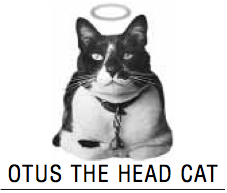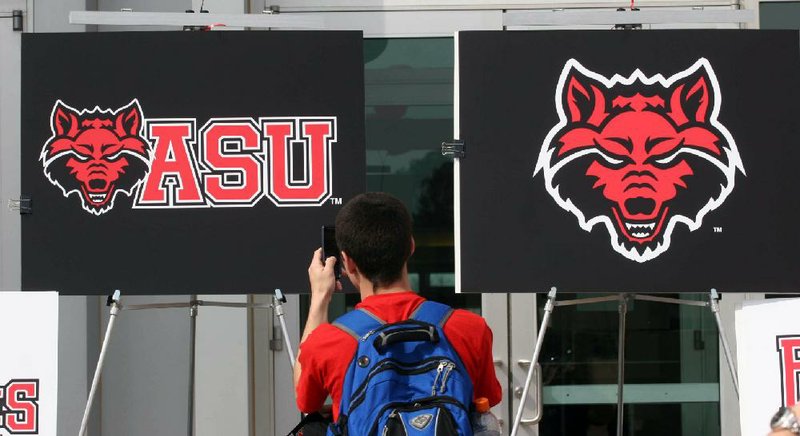Dear Otus,
I was listening to Rush Limbaugh on the radio last week and he went on for about two hours about some poll that said Indians are OK with being called redskins. Does that mean all those teams that changed their mascots can go back to the originals now?

Disclaimer: Fayetteville-born Otus the Head Cat's award-winning column of 👉 humorous fabrication 👈 appears every Saturday.
-- Al Geridhem,
Bono
Dear Al,
It was wholly a pleasure to hear from you. Unfortunately, the answer to your question is a bit more complicated. And a little sad.
Yes, the Washington Post took a survey and reported May 19, "Nine in 10 Native Americans say they are not offended by the Washington Redskins name, according to a new poll that shows how few ordinary American Indians have been persuaded by a national movement to change the football team's moniker."
Methodology: The Post conducted the poll "by live interviewers on conventional and cellular phones" over a five-month period ending in April. The statistics were compiled from 504 people (ordinary people, I assume) in all 50 states. That gives the survey a margin of error of 5.5 percentage points.
For the record, that was 504 folks out of 5.4 million Indians in America.
"Among the Native Americans reached," the Post writes, "more than seven in 10 said they did not feel the word 'redskin' was disrespectful to Indians. An even higher number -- eight in 10 -- said they would not be offended if a non-native called them that name."
Really? I presume one must consider the context. If, for example, someone used "redskin" in a pejorative sense as part of an obvious invective intended to denigrate the recipient, then "redskin" might be offensive.
If, on the other hand, one uses the term to a positive light to point out the noble cultural contributions of native, indigenous, aboriginal Americans, then not so much.
As one might expect, the poll was "immediately celebrated by Washington Redskins owner Daniel Snyder and denounced by prominent Native American leaders," who said it was continued "denigration" and "a dictionary-defined racial slur."
Snyder crowed, "We are gratified by this overwhelming support from the Native American community, and the team will proudly carry the Redskins name."
Snyder's stand evidently was enough to begin a scramble among college teams to return to their beloved mascots of yesteryear -- the mascots before 2005, when the National Collegiate Athletic Association lowered the politically correct hammer on 19 teams it deemed as having "potentially hostile or abusive names, mascots, or images."
Gone were a slew of Indian mascots: Indiana University of Pennsylvania changed to Crimson Hawks, McMurry University to War Hawks, Midwestern State University to Mustangs, Newberry College to Wolves, and the University of Louisiana at Monroe became the Warhawks.
And, of course, Arkansas State switched from its beloved Indians to Red Wolves -- a decision that infuriated alumni and perplexed all of Jonesboro.
After the Post poll, several movements began to restore the old mascots, but that's not the case with ASU. It looks as if the proprietary merchandising and licensing rights are fully vested in the lucrative Red Wolves logo.
It's just as well. Indian Joe is dead and gone, having passed to the Happy Hunting Ground of political correctness.
ASU proudly had Indians as a mascot from 1931 to 2008, when Red Wolves took over. It broke Indian Joe's heart to be replaced by an innocuous, stylized, soulless logo.
Joe was an Osage -- a fierce and proud tribe -- who was first known in the 1950s as "Jumpin' Joe." He had a hooked nose and tattooed chest; he brandished a stone tomahawk in his right hand and held aloft the scalp of a vanquished foe in his left.
By the '80s, Jumpin' Joe had devolved into "Runnin' Joe," scalp-less with long pants and a friendlier grin. His nose had become more Eurocentric.
He lost the tomahawk in deference to revisionists who felt it too militaristic and bloodthirsty. He got in touch with his feminine side by learning to knit. He wore a shirt. He watched reruns of Sisters.
It was not enough. In 2008 the university phased Joe out. It broke his spirit.
Joe applied for work with the Atlanta Braves and Cleveland Indians, but he never got a reply. He died of a broken heart with his old moth-eaten loin cloth and grimy scalp by his side.
Until next time, Kalaka reminds us that Joe is in a better place where he can be as anachronistic as he desires.
Disclaimer
Fayetteville-born Otus the Head Cat's award-winning column of
Z humorous fabrication Z
appears every Saturday. Email:
HomeStyle on 05/28/2016

